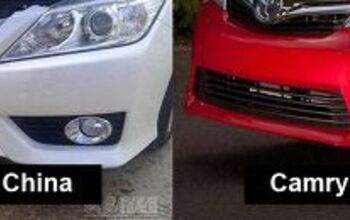Japanese Cars Continue To Suffer In China

Sales of Japanese car in the world’s largest car market, China, continue to be impacted by the war of words (and occasionally sledge hammers) over uninhabited rocks in the East China sea. Sales are inching up a bit after customers dare to come back to the showrooms of Japanese brands.
This is the way it looks in December. Sales are still down by the double digits for the month. Sales are down only slightly for the year, but this is because the trouble started in September, and before that, sales were good. The next months likely will look similar, with a slight uptrend. It will be a while until Japanese carmakers have regained trust and market share in China. Data as reported by Reuters and The Nikkei.
In Japan, the numbers will look different. Japan is on a fiscal year, which goes from April through March. The current fiscal will be impacted by seven months of slow sales in China.

Bertel Schmitt comes back to journalism after taking a 35 year break in advertising and marketing. He ran and owned advertising agencies in Duesseldorf, Germany, and New York City. Volkswagen A.G. was Bertel's most important corporate account. Schmitt's advertising and marketing career touched many corners of the industry with a special focus on automotive products and services. Since 2004, he lives in Japan and China with his wife <a href="http://www.tomokoandbertel.com"> Tomoko </a>. Bertel Schmitt is a founding board member of the <a href="http://www.offshoresuperseries.com"> Offshore Super Series </a>, an American offshore powerboat racing organization. He is co-owner of the racing team Typhoon.
More by Bertel Schmitt


































Comments
Join the conversation
Japan is kindly addressing the issue by ceasing to reproduce.
Is like some kid in trading a 20 dollar bill for a couple of shiny gold dollar coin. What do they really see in those couple of tiny islands? Is there any difference in investing heavy with Bernie Maddof and try to convince oneself is going to be a big gain? at the moment Nippon is convincing herself nothing matters and even all the car, appliance sales went totally south will justify in the end with the payoff of the tiny islands. Nippon's economy is not exactly doing splendidly could use a lot of help from the voracious consumer appetite of middle kingdom for anything that either moves or make noises.
As the Op'er... this has gotten a bit off topic. The subject matter originally being discussed is the possible reasons for Japanese vehicles loosing market share in China. The WW2 atrocities from Japan tward China were horrible. My 1st girlfriend in high school had a father who lived thru the Batan Death March and the subsequent years of living hell ... and his stories are almost tame compared to what Chinese civilians suffered. The words "horrible suffering" do not carry enough strength. Horrible x2...x3...x4 would maybe be better. In Chinese families these true and horrible stories are passed carefully thru generations. A Chinese person of today generally will respect Japan's economic model and also respects Japan's technical accumen. But most well informed Chinese families also are careful to pass to the younger generation an awarness of the very real atrocities that the Japanese Army inflicted. The same type of stories have thru history always instilled a boycott"ish" attitude. That's all I was originally saying.
You're right, my apologize for straying off topic... Your assessment of Chinese sentiments is more or less spot-on. Respect for the incredible achievements that the Japanese people have been able to make since WW2, particularly given their limited access to natural resources, but also disdain for the Japanese government's constant white-washing of war atrocities. Notice that despite the US's position in supporting Japan on the disputed islands issue, there is no widespread call or support for boycotting American goods? In fact, Ford and GM sales are both up in the middle kingdom! This really take the wind out of the sails of those who suggest that the popular resentment is being worked up by the government. If that was the case, the boycott would be more widespread to include American products. I've always found it particularly ironic that one of the most successful brands in China is Mitsubishi, a company which was very involved in the Japanese war efforts, both in armament production and utilizing slave labor in its mining operations... Anyhow, the current drop in sales for Japanese cars is not likely to change that much in 2013.